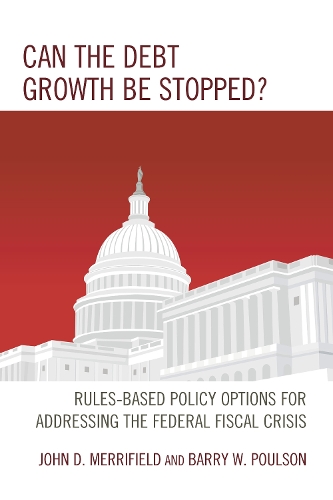
Can the Debt Growth Be Stopped: Rules-Based Policy Options for Addressing the Federal Fiscal Crisis
(Hardback)
Available Formats
Publishing Details
Can the Debt Growth Be Stopped: Rules-Based Policy Options for Addressing the Federal Fiscal Crisis
By (Author) John Merrifield
By (author) Barry W. Poulson
Bloomsbury Publishing PLC
Lexington Books
1st March 2016
United States
Classifications
Professional and Scholarly
Non Fiction
Political economy
Management and management techniques
336.340973
Physical Properties
Hardback
208
Width 158mm, Height 240mm, Spine 21mm
490g
Description
This book explores new fiscal rules introduced in OECD countries and the relevance of fiscal rules for the unique fiscal policies and institutions in the United States. The rules in different countries are compared, with a more in depth analysis of two countries with arguably the most successful fiscal rulesSwitzerland and Sweden. The study compares the challenge of fiscal consolidation facing the U.S. with that in other OECD countries. The centerpiece of the study is analysis of fiscal rules using a dynamic simulation model. A Swiss style fiscal rule is compared to an alternative fiscal rule proposed by Representative Amash, H.J.Res 24.The authors propose a new fiscal rule designed for the unique fiscal institutions in the U.S. Dynamic scoring is used to measure the impact of different fiscal rules on the federal budget, economic growth, and revenue. The effectiveness of the different fiscal rules is analyzed with respect to several criteria. A major objective of the rules is fiscal stabilization in the long run to bring debt/GDP ratios below tolerance levels. The fiscal rules are also designed for budget stabilization in the medium term, such that deficits in periods of recession are offset by surplus revenue in periods of economic expansion. The concluding section of the study explores the political economy of enacting new fiscal rules in the U.S. The study proposes fundamental changes in budget process required for the proposed fiscal rule to be effective. The study concludes with a discussion of alternative routes to enacting new fiscal rules, and the prospects for new fiscal rules to be enacted in the U.S.
Reviews
Economists Merrifield and Poulson propose adopting fiscal rules constraining growth in the federal debt. They review such rules in several OECD countries, giving particular attention to Sweden and Switzerland, which have brought austerity to their governments. The authors discuss several legislative effortsdebt ceiling, the 1974 Congressional Budget and Impoundment Control Act, the 1985 Gramm-Rudman-Hollings Balanced Budget Act, the 1990 Budget Enforcement Act, etc.to add constraints to US finances. They propose a constitutional amendment allowing deficits in recessions to be offset by surpluses during economic expansions. The result, they say, would be a debt-to-GDP ratio declining to more comfortable levels.... Summing Up: Recommended. Graduate students and faculty. * CHOICE *
Can we learn which policies promise the most sustainable path to fiscal responsibility by examining how OEDC countries responded to the debt build up during and after the great recessionMerrifield and Poulson consider this question in their interesting and insightful book, Can the Debt Growth be Stopped. -- Dwight R. Lee, Southern Methodist University
Merrifield and Poulson offer substantial insight into the reasons why countries find themselves with excessive deficits and debt. By examining the successful debt control measures in Switzerland and Sweden, they provide a strong foundation for their own proposal to limit deficit spending and reduce the national debt. -- Randall G. Holcombe, DeVoe Moore Professor of Economics, Florida State University
Author Bio
John D. Merrifield is professor of economics at the University of Texas at San Antonio. Barry W. Poulson is emeritus professor of economics at the University of Colorado.
